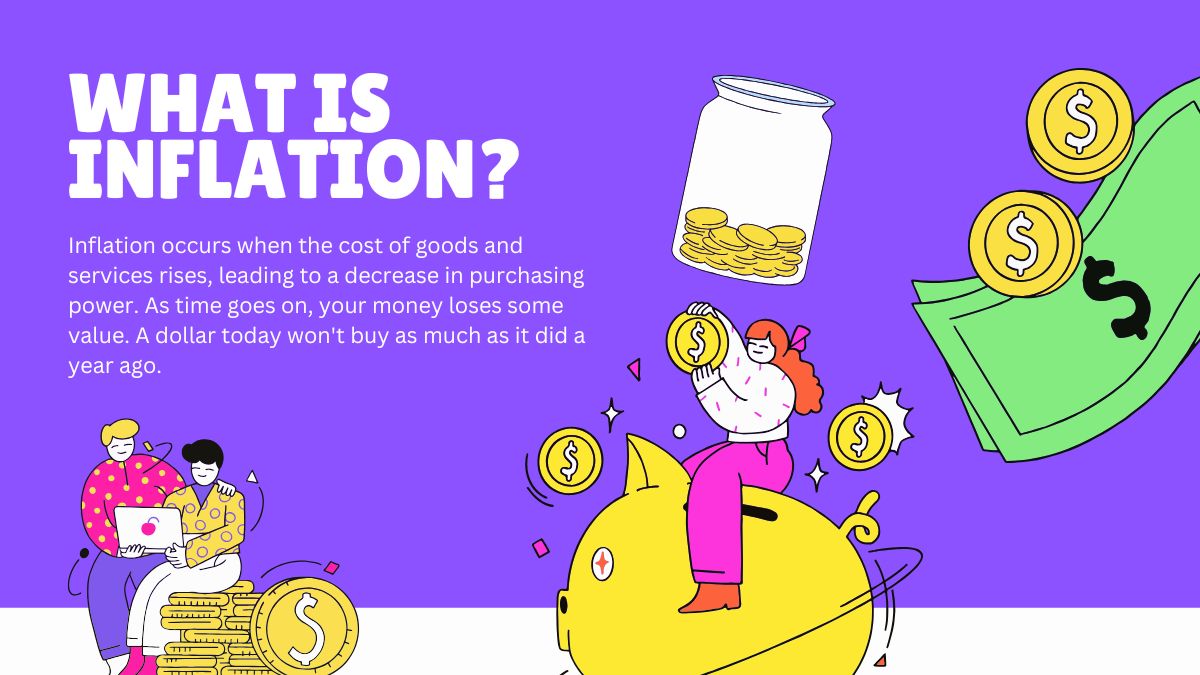Inflation. It’s a common word, especially when prices seem to keep rising at the grocery store or gas pump. But what exactly is inflation, and how does it impact your investments? Let’s break it down in simple terms.
What is Inflation?

Inflation occurs when the cost of goods and services rises, leading to a decrease in purchasing power. As time goes on, your money loses some value. A dollar today won’t buy as much as it did a year ago.
Why Does Inflation Happen?
Inflation is caused by a variety of factors, including:
- Demand-Pull Inflation: When demand for goods and services exceeds supply, prices rise.
- Cost-Push Inflation: When the cost of production (like raw materials or labor) increases, businesses pass those costs onto consumers in the form of higher prices.
- The cost of living increases, leading to higher wages and higher prices, leading to built-in inflation.
- Government increases in the money supply can also result in inflation when the amount of money in circulation increases.
How Inflation Affecrs Your Investments?
Here’s what you need to know: how inflation Affects your investments. In order to make informed investment decisions, it is crucial to understand its effects.
Erosion of Purchasing Power
A direct effect of inflation is the erosion of your purchasing power. If your investments aren’t growing at a rate that outpaces inflation, your real returns (returns adjusted for inflation) are actually negative.
For example, if your investments earn a 3% return, but inflation is 4%, your real return is -1%. You’re losing money in terms of what you can actually buy.
Impact on Different Asset Classes
Stocks
Investing in stocks can provide some protection against inflation, especially for companies with pricing power (the ability to raise prices without losing customers).
Investors may become worried about the impact of high inflation on corporate profits when stock markets are volatile.
Bonds
Bonds, particularly fixed-rate bonds, are vulnerable to inflation. As inflation rises, the real value of the fixed interest payments decreases.
The principal value of inflation-protected securities, like Treasury Inflation-Protected Securities (TIPS), is adjusted as inflation increases.
Real Estate
Real estate can be a hedge against inflation. Property values and rental income often rise with inflation.
However, rising interest rates, which often accompany inflation, can make mortgages more expensive.
Commodities
Commodities like gold, oil, and agricultural products can also act as inflation hedges. Their prices tend to rise during inflationary periods.
However, commodities can be very volatile.
Cash
Cash is the most vulnerable asset to inflation. Holding cash in a savings account that earns less than the inflation rate means your money is losing value.
Interest Rates and Inflation
- Central banks often raise interest rates to combat inflation. Higher interest rates can impact investments in several ways:
- They can make bonds less attractive as newer bonds offer higher yields.
- They can increase borrowing costs for businesses, potentially impacting their profitability and stock prices.
- Higher interest rates can also make saving more attractive.
Strategies to Protect Your Investments from Inflation
So, what can you do to protect your investments from the effects of inflation? A few strategies are listed below:
Diversification
The importance of a well-diversified portfolio cannot be overstated. By diversifying your investments, you can minimize inflation’s impact.
Stocks, real estate, and commodities tend to perform well during inflationary periods.
Inflation-Protected Securities
TIPS are designed to protect your purchasing power, so you should consider investing in them.
These bonds adjust their principal value in line with the Consumer Price Index (CPI), a measure of inflation.
Real Assets
Real estate and commodities can offer a hedge against inflation.
Investing in real estate investment trusts (REITs) can provide exposure to the real estate market without directly owning property.
Stocks with Pricing Power
Invest in companies with strong brands and the ability to pass on rising costs to consumers.
These companies are more likely to maintain their profitability during inflationary periods.
Short-Term Bonds
During periods of rising interest rates, short-term bonds can be a better option than long-term bonds.
Short-term bonds mature quickly, allowing you to reinvest at higher interest rates.
Regular Portfolio Review
Regularly review your portfolio and adjust your asset allocation as needed.
Stay informed about economic conditions and inflation trends.
Consider Value Stocks
Value stocks are often from established companies that are undervalued by the market. These companies often pay dividends and can perform well during inflationary times.
Long-Term Perspective
When investing, it is crucial to keep a long-term perspective. Inflation is a natural part of the economic cycle, and markets tend to adjust over time. Don’t make impulsive decisions based on short-term fluctuations.
Also Read:
- 10 Best Blockchain Startups in India: Innovation and Growth
- What is Zero Debt Insurance? Protecting Your Legacy with Insurance Coverage
Key Takeaways
- Inflation erodes your purchasing power, impacting your investment returns.
- Different asset classes react differently to inflation.
- Diversification and inflation-protected securities can help mitigate the impact of inflation.
- Stay informed and maintain a long-term investment perspective.
By understanding how inflation affects your investments and implementing appropriate strategies, you can better protect your financial future. Remember, consulting with a financial advisor can provide personalized guidance based on your individual circumstances.

